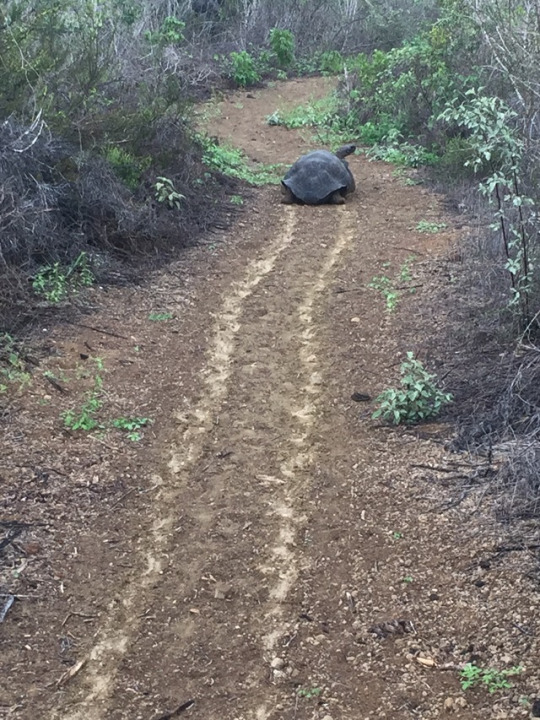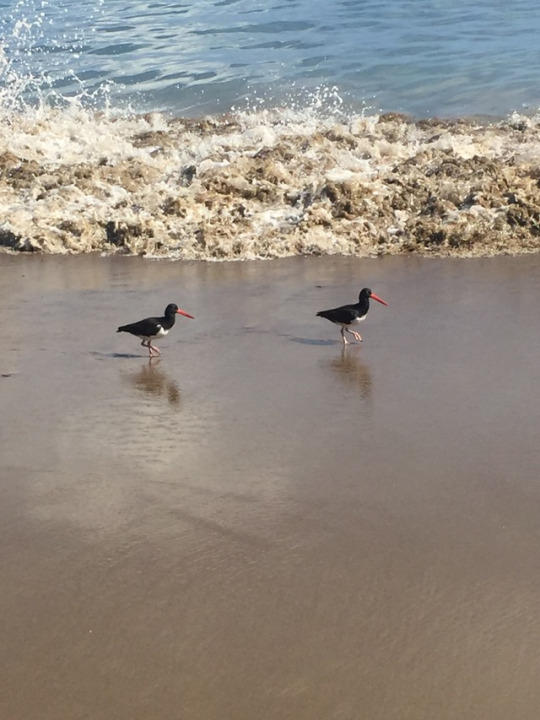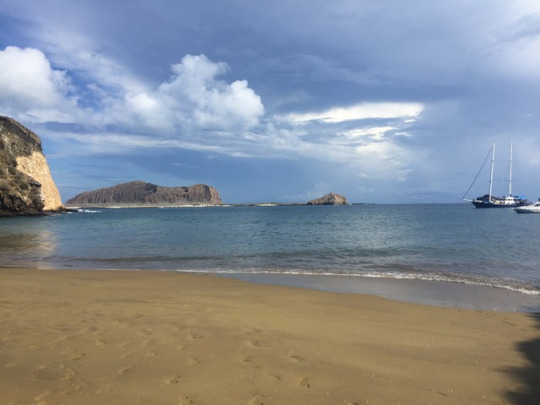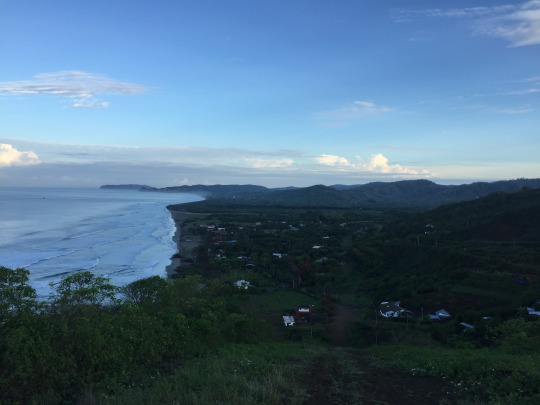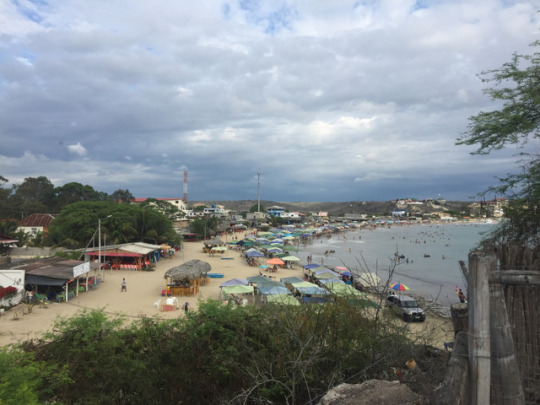Text
4 months later...
I am back in the Galapagos! I wanted to be sure to include a section in this blog that circles back with the community to see how the women’s coalition is doing. Sofia and Erica have taken the lead as the co-presidents of the women’s coalition, now titled: Mujeres Juntas, or Women Together. They are responsible for hosting the monthly meetings at the church’s community center and for helping to organize events. Attendance is recorded by Erica via a sign in sheet at every meeting. Since the commencement of this program, attendance has swelled to about 20 consistent members! As Maria suggested, they have held fundraising sessions wherein the money raised is collected and will go to a selected female student at the end of the academic year to attend university on the mainland. Camila assisted in facilitating an event at El Gato Negro where all the profits made between 4-8pm would be allocated to Mujeres Juntas!
Originally, we had planned to have Erica and Sophia run the show as the sole organizers of the coalition, but due to the increase in membership and planned events, it became too overwhelming for them. To combat this, an executive board was elected to help with events and programs. Maria was nominated Community Ambassador. One barrier we have encountered is the lack of internet in low-income household on the island. This has made it difficult to reach out to a broader, more diverse population. Part of Maria’s job is to increase membership by publicizing their events and reaching out to new special interest groups on the island to form networking connections. Camila was named Secretary; she essentially keeps everyone organized and delegates responsibilities to coalition members who wish to take on a more active role.
To evaluate the effectiveness of the coalition, I asked members to complete the same survey I utilized for preliminary assessment. After comparing the pre and post program survey, I shared with Erica, Sofia and Camila the results: women scored higher for familial empowerment. This suggests that women feel more comfortable taking an authoritative role at home. The results indicating change in social, political and economic spheres are inconclusive, which is reasonable considering the coalition has only been active for a few months.
I am so proud of all that these women have accomplished and I cannot wait to continue working with them to further all of the great work they have already done. Until next time!
0 notes
Text
Reflection: August 15th, 2027
I have had the most wonderful experience here on Santa Cruz island! Working with community members on an issue I’m passionate about has been a rewarding and humbling opportunity. Understanding community needs, analyzing qualitative data, and developing an intervention, and implementing and evaluating that intervention is my favorite part of my job. I am looking forward to returning to the island in just a few months to evaluate the implementation of the women’s coalition. I have complete confidence in Erica, Sofia and Camila to continue the work we have begun this summer, and to enhance community awareness of gender disparities on the island. Going forward, I hope to continue to raise awareness of gender disparities at home and abroad through more community-based approaches to research and development and implementation of grassroots initiatives.
0 notes
Text
Week 8: August 8th-14th, 2027
Earlier this week I met with Erica, Camila and Sofia to discuss next steps for the project. We decided that expanding Maria’s idea of forming self-help groups would be the best way to continue raising awareness of gender disparities and empowering women on the island. The women on this island already seem to have a tight knit community; they oftentimes meet before church or hold community dinners. The hope with these self-help groups, or a women’s coalition as we’ve decided to call them, is that they will provide more structure and focus to an already strong women’s community on the island. I’m really excited about forming this group! We envision it to be a coalition of women who come together, not only to talk about strategies to dismantle the patriarchy and empower each other, but a real group in the community that strives to reach equality through a number of events.
As I leave to head back to the states next week, I decided to hold another Town Hall Meeting to share preliminary findings with the community as well as gauge community interest in a women’s coalition. The room was, yet again, packed! Unlike the first town hall meeting, I recognized everyone in the crowd. Most of the women I had interviewed were there, Jorge, Diego and a few others were there too. Sofia smiled encouragingly at me from the front row. I began my presentation by highlighting community assets: the beautiful coast, the amazing wildlife, the way in which everyone looks out for their neighbor – all of these wonderful qualities were prevalent throughout the interviews and focus groups. After that, I shared some of the quotes I heard from my interviews with community members that illustrated women disempowerment and existing gender disparities. To my surprise, the room was silent. No one raised any objections or feelings of discontent. I followed with our idea of a women’s coalition to ameliorate these feelings of disparity and to hold events on the island to raise awareness of these issues. I then asked everyone if they had any questions, concerns or ideas that they would like to share. Maria raised her hand, “I was thinking the women’s coalition could host a few fundraising events to sponsor a chosen girl to go to college on the mainland,” she said proudly. There was a lot of head nodding and encouraging responses from the crowd. A few more individuals pitched ideas for the coalition including a support group, empowerment workshops and other fundraising ideas.
“What will you do when you leave?” said Jorge from the back of the room, “Are you ever going to come back?” I assured Jorge and the rest of the community that I would be coming back to the island three times a year: once in both the fall and spring for a week and then I would dedicate one month every summer to returning to the island.
0 notes
Text
Week 7: August 1st-7th, 2027
I apologize for the gap in my posts. Last week was extremely rainy and so the internet connection at Erica’s house was quite poor. I have been thinking a lot about my interview with Jorge, so much so that I decided to convene a men-only focus group with individuals Jorge identified as being more liberal, in the sense that they are aware of gender disparities and the culture of masculinity on the island. The group consisted of five young men: Jorge, Marco, Julio, Mateo and Diego. Marco is another tourist ship captain who works directly with Jorge. Julio works at the university center as an associate professor, Mateo is a construction worker and Diego works as the head of dining at a hotel just a few miles away. We discussed strategies for raising awareness among men. While the goal of my research was to specifically empower women, I think it is equally important to empower men to feel comfortable supporting women; as Jorge said in my first interview with him, it would be difficult to try and create change with only half of the population on board. The strategies we came up with focused predominately on altering the societal construction of what it means to be masculine. To do this, we plan to create a poster campaign in which men will be pictured with a quote next to them illustrating their support of women and dedication to equality.
0 notes
Photo
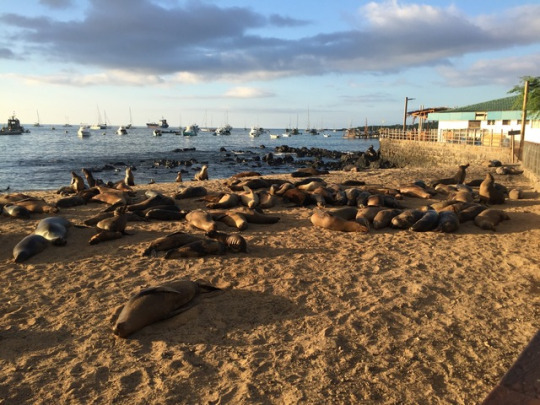
Taken on my way to my interview with Jorge. I have never been so close to so many large animals in my life!
0 notes
Text
Week 5: July 18th-24th, 2027
This week was rather busy. I had worked for weeks to develop a semi-structured interview guide with Erica, Camila and Sofia. I wanted to be sure my questions were to the point, but could not be construed to be “white feminist” or offensive to Ecuadorian culture. We also developed a short survey that we would give to each of the women who participated in the project, either through interviews or focus groups. The survey’s goal is to assess self-efficacy, perceived autonomy, and perceived empowerment. In order to avoid priming the participants, we decided to give the women the survey after the interview or focus group. An example of a survey question is: On a scale of 1-5 with 1 being the least comfortable and 5 being the most comfortable, how comfortable do you feel talking to your partner about money? In a perfect world, I would send out an anonymous survey to all the women on the island, but due to the small population size, this is infeasible. However, we believe that the survey we have created will be an effective, preliminary assessment tool as well as evaluative tool following implementation of an intervention.
We held our first focus group of 6 women Monday evening. The women all knew each other - which wasn’t exactly surprising considering the small knit community on the island. When I asked, “How do you feel your position as a woman has affected your work life?” The women became very animated when detailing all of the microaggressions they had experienced in the workplace. Maria, a middle-aged woman who is the vice president of the nearby hotel said, “One time I saw a few of the janitorial staff smoking on the property, which is strictly forbidden, and I told them to put out their smokes and get back to work. One of them laughed and told me that the 4th floor still needed to be cleaned. I was enraged. Just because I’m a woman he assumed I must be a maid? Well, he was fired that afternoon.” All the women laughed. Another woman named Selena added, “You would think gender disparities would only exist in blue collar jobs, where there is a tendency for there to be less education about these issues, but I’ve found sexism to be just a prevalent in higher power positions. I have a doctorate in climate change and yet I still experience sexism. I had to work twice as hard as any man to get where I am today.”
The last question I posed to the group was, “What are some feasible strategies to combat this culture of toxic masculinity? And to empower women on this island?” An older woman who had been fairly quiet up until this point scoffed. “We cannot change men. They are too set in their ways. If we want to create change, it has to come from us.” The other women nodded their heads in agreement. “What about self-help groups?” said Maria, “We could hold bi-monthly meetings in which we talk about this stuff, because I think even just raising awareness of these issues can help.” “We could even hold workshops on how to confront men about their behavior, and how to become more self-confident,” Selena suggested.
Perhaps my favorite interview this week was, surprisingly, with a man. Jorge is a young man who was raised on the mainland, but now works as a captain on the tour ships. When he contacted me and asked to be interviewed, I have to say I was little pessimistic. I assumed he would rant about how men are given a bad reputation and my research would negatively affect tourism on the island if it were ever to be published. We agreed to meet on the dock on a Tuesday morning before his shift. It was 7 in the morning, but it was already nearly 75 degrees. I saw him from a distance as I walked down the dock. He was loading massive crates onto the boat, but stopped and waved when he saw me coming. We said hello and got settled under some shade on the boat. “I appreciate the work you are doing for us”, he began, “but I worry that your approach alienates the men on this island...and it is hard to make a change with only half of the population on board”, he laughed, seeming amused by this accidental pun. “I don’t think most of the men here understand that masculinity, as you define it, is not inherently a bad thing. I think you can be masculine, and still respect women as equals, still advocate for their rights… you must find other men like myself who support your research. It’s unfortunate, but I think the men who really need to hear your message will only listen to men. You know?”
After asking for names of men he believed would be helpful to interview, we parted ways. I promised to keep him updated with any progress we make. This was a unique opportunity for me as the researcher to check my biases. While I understood that not every man on the island was sexist or participated in predominately sexist culture, I failed to recognize that there were some men who actively recognized women disempowerment and their role in women’s oppression. Going forward, I hope to encourage interested men to participate in my research.
0 notes
Text
Week 4: July 11th-17th, 2027
We held our first town hall meeting today in the main church’s community room. Erica and I had posted a number of flyers, but I guess I wasn’t really sure how many people to expect. I had received about 15 emails and calls from all women who were interested in being a part of my research. I was hoping that after the Town Hall Meeting more women would come forward.
I began a few minutes after six, the designated start time. Accustomed to the rigid punctuality of the northeast, I grew anxious when it seemed the room would not fill up. By 6:15pm the room was absolutely packed, with standing room only. There were a few young couples with children, including Camila and Felipe, men of all ages, and a few young women who came alone. I began my introducing myself, providing some background on my previous education and research, and presented my research question to the group: How does the saliency of masculinity and gender disparities on the island affect women’s feelings of (dis)empowerment and self-efficacy? The room went silent. A few of the women I had previously spoken to were nodding in encouragement, while others simply looked at the floor. After a few seconds a couple of hands shot up - all men. “Are you blaming us for what women cannot do? Isn’t it their responsibility to feel empowered, as you call it?” said one man, seated in the second row next to his wife, a woman I had rarely seen since my arrival. This defensive theme prevailed throughout the question portion of the town hall meeting. I explained that while being a man is not inherently oppressive, men hold a special position of privilege in this community that can often leave women feeling disadvantaged. While it was off to a rocky start, the dialogue slowly shifted from defensive to curious. At one point, Camila raised her hand and began to speak, “Not every man on this island treats women as less than equals. But there is a culture of viewing women as less than [men]. Less smart, less competent, less powerful…and that has to change. I do not want my daughters growing up thinking they are less than anyone, especially men.”
A few women stayed after the meeting to talk with me about the focus groups and interviews. They seemed excited by the opportunity to create a cultural shift in the community. Erica and I went home feeling excited by the energy felt in the room.
0 notes
Text
Week 3: July 4th-10th, 2027
Erica, Sofia, Camila and I met to discuss our goals for the project at our home on a Sunday afternoon. I took notes throughout, and asked questions as to how to best promote gender equality while maintaining traditional cultural values. “I understand why you want to have a town hall meeting, Nicole, but I don’t think many men here will be receptive to the project, they will just get in your way,” said Sofia with a sigh. “Even some older women I know are opposed to the whole idea,” Camila added quietly. “But most women see the need for outside help”, said Erica touching my arm, “...we have to rally all of the women who have spoken to us in these past few months and encourage them to come to the meeting to voice their opinions publicly.”
We discussed the balance of empowering women and maintaining traditional values for a long time - with Camila and Sofia speaking specifically to the norms held on the island. We all agreed to meet once a week to discuss any progress I’ve made with my research. Typically, when I am involved in a research project, I have a group of trained public health scientists who help support me. Traveling to the island alone, I have begun to feel overwhelmed by the scope of my project. By hosting Erica, Camila and Sophia once a week, I hope to foster an environment of discussion and mutual support.
0 notes
Text
Week 2: June 27th-July 3rd, 2027
I’ve posted flyers for the town hall meeting in the cafe and other community centers. A few patrons have made sure to tell me directly that they will be there. The flyers had a section at the end that read, “If interested in participating in focus groups or anonymous interviews, contact Nicole Kase at…” with my name, phone number and email address. The rest of the week was rather relaxed, as there was quite a bit of rain.
I’ve attached some pictures to show you all how beautiful this island is! One thing that has really stood out to me about this small community is their commitment to the environment and sustainability. Most people I know dutifully compost and use significantly less “stuff” than we do in the states. I have learned a lot about waste management from living here for just a few weeks. When I return home, I hope to incorporate some of these sustainable habits into my daily living patterns.
0 notes
Text
Week 1: June 20th-26th, 2027
I spent my first week in the Galapagos exploring the island. Traversing through the town’s market, the beaches and side streets. As a tall white female, I tend to stand out in the crowd. Fortunately, everyone I have interacted with thus far has seemed excited by my being on the island. Sofia was extremely helpful in introducing me to community leaders. Thus far, I’ve met the pastor of the church where I attended mass last week, the manager of Hotel Flamingo (perhaps the largest tourist revenue source on the island), and the manager of El Gato Negro, the most frequented café on the island.
I applied to be a barista at El Gato Negro as Camila suggested, and got the job. It seemed like a good idea; I could make some pocket money, get to know the locals, and brush up on my Spanish all at once. I work part-time, only about 8-10 hours a week, which gives me ample time to work on my research project. I enjoy working there, and often witness interesting interactions between the men and women on the island. For example, the cafe is frequented by men and teenaged kids. There are very few women over the age of thirty who come to the cafe. Yesterday, I saw Felipe in the cafe with a few of his male friends. When I asked where Camila was, he said she was at home taking care of their girls. “She’s either here working, church, the market or at home with the kids,” he laughed. This is just one example of how I’ve seen men to be the one who holds the power in relationships.
In this time, Erica and I spoke about how I should go about recruiting for my project. It was decided to have a town hall meeting. If I’ve learned anything from Nancy Scheper-Hughes, it is to be transparent with the community you are studying. While the idea of telling a group of locals I wish to study the pervasive sexism that exists on the island doesn’t exactly sound pleasant, I know it is necessary for long-term community trust and support for the project.
0 notes
Photo
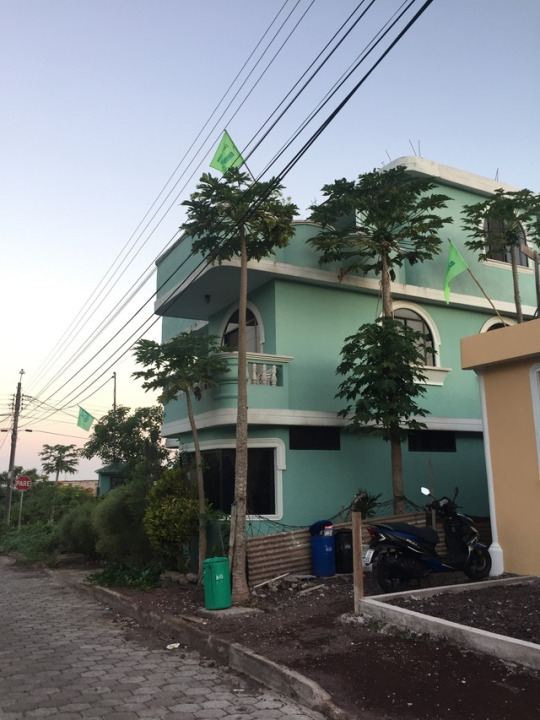
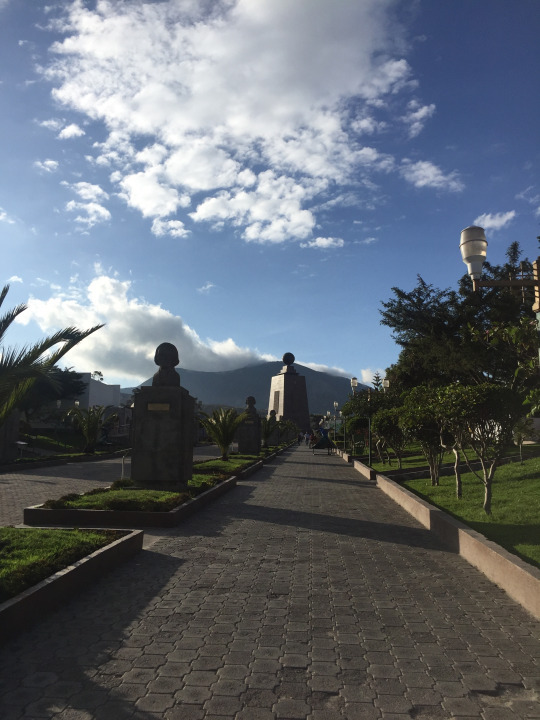
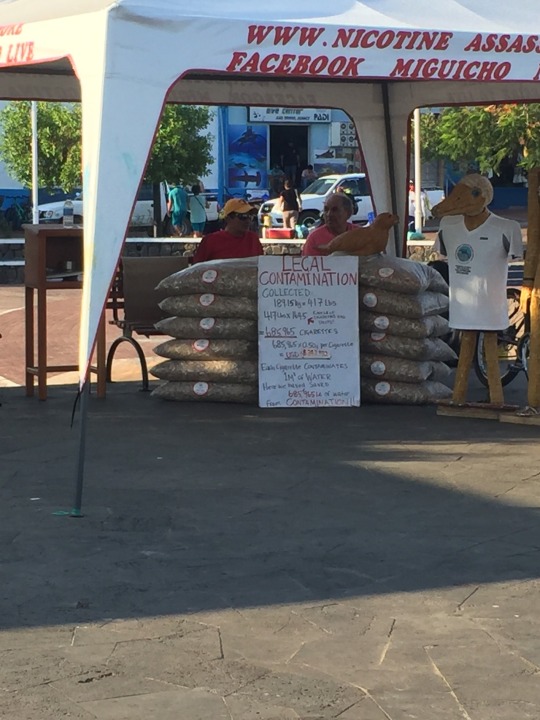
Here are some pictures from my walks through town! To provide some context for the last picture, the locals had collected discarded cigarette buts left on the beach. Can you believe the amount of waste and contamination? The community is fiercely dedicated to waste management and sustainability.
0 notes
Text
Day One: June 16th, 2027
I arrived on the island after 9 long hours of travel. The heatwave that hit me as I exited the plane was suffocating. Being originally from the Northeast, my definition of humidity was perhaps a bit conservative. It only took about a minute before I felt my shirt begin to cling to the sweat on my back. Erica picked me up from the airport in Ecuador and we traveled to Santa Cruz, the island with the largest human population at about 12,000 residents. She has planned a low-key night for us: 1) unpack all of my belongings, 2) attend evening mass at the church, and 3) stop by her neighbor’s house for dinner. I’m absolutely exhausted, but I am so excited to get out into the community and start meeting people!
The church is situated at the end of the main street in town. The church itself was small, but quaint. Having arrived a few minutes early, Erica began to introduce me to a few women on adjacent pews. I first met Sofia, a young woman who works directly with Erica at the station. She shook my hand firmly when introduced and greeted me with a welcoming smile. Sofia was one of the women Erica consistently mentioned during our Skype calls. Sofia’s family has been on the island for generations, and therefore is known and respected by everyone on the island. I’m told she is the neighbor who is having the dinner later that evening. I also met Camila; she is a waitress at the popular cafe in town, El Gato Negro. She is married to young man Felipe who works in agriculture and has two young daughters. She greets me warmly with two kisses and encourages me to come to the cafe where there is a part-time job opening up.
After an eventful first day, I fell asleep almost immediately despite the sweltering heat. Meeting Sofia and Camila at the church has made me even more excited to begin my project!
0 notes
Text
Background: June 10th, 2027
Why the Galapagos? Doesn’t gender disparity exist all over the world?
Yes, this is true - but I was asked specifically to study in the Galapagos by my dear friend, Erica Moore. Erica was my college roommate where she studied Environmental Health. Shortly after graduation, she moved to the Galapagos to work as at the Charles Darwin Research Station, which is used to conduct environmental research and promote environmental education. Her and I catch up about once a month, and she loves telling me about current environmental initiatives, her friends on the island, and the range of hardships she encounters. Having lived on the island for about 9 years now, Erica has a great understanding of existing cultural norms and values. Often the topic of conversation turns towards what Erica perceives to be a large barrier for women on the island: the patriarchy. Like many other Latin American countries, Ecuador and specifically- the Galapagos islands, are predominantly Catholic. Catholicism inherently privileges men’s power in the social, economic and political spheres. Erica has confided in me her struggle to help women feel empowered on an island wherein the norm is to view women as submissive, and whose sole purpose is to care for their husbands, their children, and their homes.
What do gender disparities have to do with health?
I am so glad you asked! Gender has everything to do with health. What happens when men and women are not viewed and treated as equals? Women suffer - mentally, economically, socially, and politically. All of these components aggregate to socioeconomic status (SES). Numerous studies have linked SES with health; in other words, the higher your SES, the healthier you are. Furthermore, gender is a social construct, similar to race, and understanding how society informs these social/cultural restrictions on an individual’s identity is crucial to creating a healthy environment for all.
What are next steps?
I leave for the Galapagos in six days. I have been preparing myself for a few months now, brushing up on my Spanish and talking with Erica specifically about cultural competency. I’ve also been fortunate enough to receive a federal grant that will subsidize my travel and living expenses. My plan is to live with Erica for about two months while abroad, after which, I will identify a single foolproof way to dismantle the patriarchy! Just kidding. But I will offer my ideas for strategies to decrease the gender gap and empower women.
0 notes
Text
Introduction: June 9th, 2027
Hi everyone, my name is Dr. Nicole Kase and I am a Public Health researcher with a particular interest in gender studies. I’ve decided to create this blog to keep fellow colleagues, family and friends up to date with my new research project: Patriarchy in Paradise. I will be traveling to the Galapagos wherein I will be studying gender disparities - particularly female disempowerment through an ethnographic lens.
*The individuals I mention in my posts will be de-identified to protect the people of the Galapagos.
0 notes
